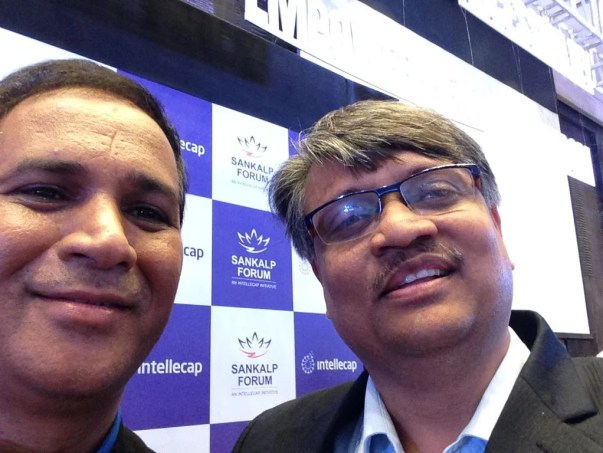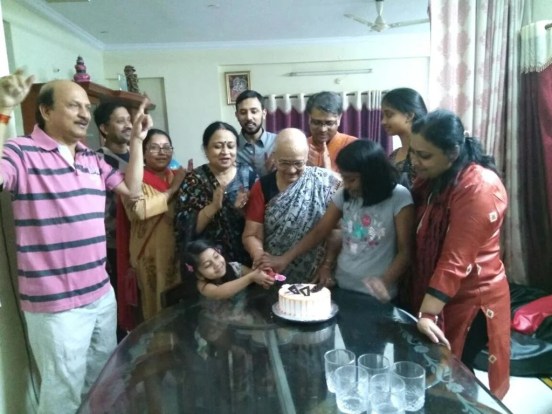
It was in 1994 that Manish stepped out of IIFM after having completed PGDFM. He recently completed a short stint with Pricewaterhouse Coopers (PwC), where he worked in capacity of an Associate Director in their Agriculture and Social practice, where he led a project on rural business incubation. Manish shall soon be transitioning in a new role with some other organization which shall give him an opportunity to integrate climate work to his previous body of work. Before joining PricewaterhouseCoopers, he led the agriculture practice at Intellecap for nearly a decade. In that role he designed and delivered several projects in agriculture and the allied sectors like dairy, poultry, fishery and horticulture for corporate, private foundations, and DFIs, both in Asia and Africa. Manish has nearly 27 years of experience in domains of social research, program designing, program implementation, and consulting. He has a passion for both climate smart and regenerative agriculture and bear the conviction that new age agriculture technologies can go a long way in strengthening the livelihoods of smallholder farmers.
Social Media: https://www.linkedin.com/in/manish-shankar-6082a341/?originalSubdomain=in
Q. How has been your journey from IIFM to this role?
A. It has been an interesting journey which has been punctuated with several surprises, attempts at unlearning, reinvention and learning new things.
Q. What were some of the key milestones/learning in this journey that you would like to share with us?
A. At the start of this journey two terms that formed the bedrock of my work were “people’s participation” and “sustainability”. I actually believed that “participative rural appraisals” could change the world. I was completely oblivious of role of political economy in development. By the year 2000, I was blooded into the world of hard data like the census of India, SRS, NFHS, NSSO, etc. This shifted my focus from relying on primary data alone to a blend of secondary and primary data. This was also the time when I got involved in preparing the state-level Human Development reports for MP which gave me an opportunity to hone and put to good use my analytical skills. Barring an initial stint of four years with Ballarpur Industries limited beginning 1994, I looked at myself as a social researcher who was equally good at collecting, collating, and analyzing primary data and crunching large volumes of secondary data. However, all my work with data paled in insignificance with the advent of big data on the scene, but this was much later. 2008 witnessed my three-year foray into direct grassroots level implementation of livelihoods programs where I found myself forming Farmer Producer Organizations, implementing agriculture extension programs at scale, and implementing livelihoods programs in several interesting value chains like sericulture, pulses, and vegetables. This was also the time when I learnt value chain analyses that helped me design several livelihoods programs, later in my professional journey. My consulting journey began with Intellecap in 2011 and soon I began fancying myself as a ‘solver’ who could identify the problems being faced by the clients and could recommend practical solutions to those problems. This was a phase of journey that helped me hone my skills at preparing MECEs (Mutually Exclusive Comprehensively Exhaustive) of problems that needed solving. At Intellecap, my work became more broad-based in terms of geographical coverage, as several of my projects took me to different countries in Asia and Africa.
Q . What is the most satisfying part of your current role?
A. The fact that rural business incubators catered to nano-enterprises run by very small entrepreneurs was the most satisfying part of my job at PwC. At Intellecap the core purpose was to nurture the entrepreneurial ecosystem. Therefore, moving on from Intellecap in 2021, the choice of leading a project which aimed at establishing and managing two rural business incubators in Uttarakhand for PwC was not difficult to make. As Part of Intellecap, I had helped establish an incubator for the Tibetan Government-in-exile at Dharamshala, HP. Therefore, my short stint at PwC, where I managed two physical rural incubators was not much of a challenge.
Q.Has your learning at IIFM helped in shaping how you approach your professional roles?
A. Learning at IIFM has definitely helped in shaping how I approached my professional roles at the start of my career. I unlearned most of what was propounded by Hardin in his “Tragedy of the commons” and embraced much of what was propounded by Ostrome in her seminal work titled “Governing the commons”. I graduated from “people’s participation” to “human centric design”. I graduated from zero to evidence based program designing which was informed by Value chain analyses.
Q. Who (or what) are the biggest influences or drivers in your careers. What would be your advice to freshers and IIFM graduates who are looking to choose similar sectors/roles?
A.I would like to acknowledge the following individuals who have had a great impact of my journey since I left the campus. Two of these are fortunately my batch mates from IIFM, one who comes from a political background and one precocious individual who is also an IIFMite. They are listed below with the huge contribution that they have made in my journey.
- Mr Sandeep Dikshit, ex-MP and Proprietor of Sanket Development Group – All I learnt about data, I owe to him.
- Mr Anish Kumar (PFM 1992-94), Transform Rural India – His intervention ensured that I could train with one of the internal cohorts of PRADAN to learn the ropes on livelihoods in 2007-08
- Mr Vineet Rai (PFM 1992-94), the Founder of Intellecap, who was instrumental in first getting me to do some interesting work in microfinance and later blooding me into consulting and
- Mr Santosh Kumar Singh (PFM 2004-06) – Who helped me in putting together a robust personal knowledge management system (PKMS) in place. Consultants need to learn continuously, which becomes most effective when a PKMS is used.


My advice to fresher and IIFM graduates, who are interested in consulting is to adopt a robust Personal Knowledge Management System ASAP and do read as much as you can. Second, keep learning new skills to augment your skill sets. Also try out what Dr Harivansh Rai Bachchan very famously said:
किस पथ से जाऊं ? असमंजस में है भोला-भाला
अलग अलग पथ बतलाते सब, पर मैं यह बतलाता हूँ
राह पकड़ तू एक चला चल , पा जायेगी मधुशाला
PS: Please do not confuse “staying the course” with reluctance to learn new things, experimentation, reinventing yourself, and proclivity to take risks. This is about staying true to your core purpose.
Finally, the most important advice that I can give, for whatever it is worth, is to take risks. And take them as early in your career as possible.
Q. What are your favorite memories during your IIFM days?
A. There are quite a few many. But my second OT with Vineet Rai, my batch mate from IIFM, stands out. I remember publishing a piece called “The Muniguda Days” in the Canopy, our IIFM magazine, which featured some hilarious situations. Needless to say that Vineet was the central character in all my stories. Later he was instrumental in regaling several of our colleagues at Intellecap with those stories.
Q. In hindsight, what was the biggest contribution (courses, faculty, library, friends, and alumni. Anything else!!) or take away from IIFM that you think played a critical role in shaping you as an individual or professional?
a. The library.
b. Prof B P Pethia – taught us Financial Management and Managerial Communications and “encouraged” me to appear for campus interview with Ballarpur Industries Limited, my first employer.
c. Prof P K Biswas – Who kept in touch with me, both virtually and in person all through the last 25 years.
Q. The best friends / seniors /faculty at IIFM? Some memorable tidbits that you like to share?
• Mr DK Daukia (my super senior from IIFM) – All I know about raising a nursery and estimating the volume of wood in a standing plantation is his contribution to my learning.
• Mr Sushil Sehgal (my super senior from IIFM) – Had the privilege to work with him on a Joint Forestry Management (JFM) in “Harda-Cambridge project” funded by FCDO and implemented by Dr Bhskar Vira, Department of Geography, Oxford University.
• Mr Varun Singh (my immediate senior at IIFM) – for always being very supportive (especially when I was in a very dark place post my Dad’s demise).
Q. As an alumnus, what is your advice to freshers or those are joining IIFM to get best out of the 2 years there?
A. Learn, learn, learn and have fun!
Q. What is your typical day at the office?
A. Consulting is a full-time profession. One keeps traveling all the time. It’s not a nine-to-five affair.
Q. And how about weekends, Hobbies, Family and anything else you want to add
A. Reading, traveling.

Q. Favorite Books, movies, authors?
Fiction – Wilbur Smith; Non-fiction – (several).
Q. IIFM is driven by alumni’s passion and commitments towards its goal. How would you like to contribute to IIFM or IIFM alumni, students?
A. I do not really know. You tell me if you need anything and I’ll let you know if I am up to it.
Q. What do you think is different at IIFM now vs when you studied there? What do you think is a positive change and what is not?
A. • Strength of the class – there were just 25 of us (positive).
• We passed out in 1994. So Windows 95 had not hit the market (positive).
• Environmental science was not taught to us, even as an elective (positive).
• I believe that the spirit of togetherness has waned over time. “ज़िन्दगी मिल कर बिताएँगे” sentiment needs to be strengthened both within the batch and among different batches.
Q. Any suggestions on who you want to get profiled / interviewed here?
A. D K Daukia, Harsh Mehta, Ambatipudi Chandrabhanu, Domo Diyum, Kanchan Ghoshal, Varsha Mehta & Manish Verma.

